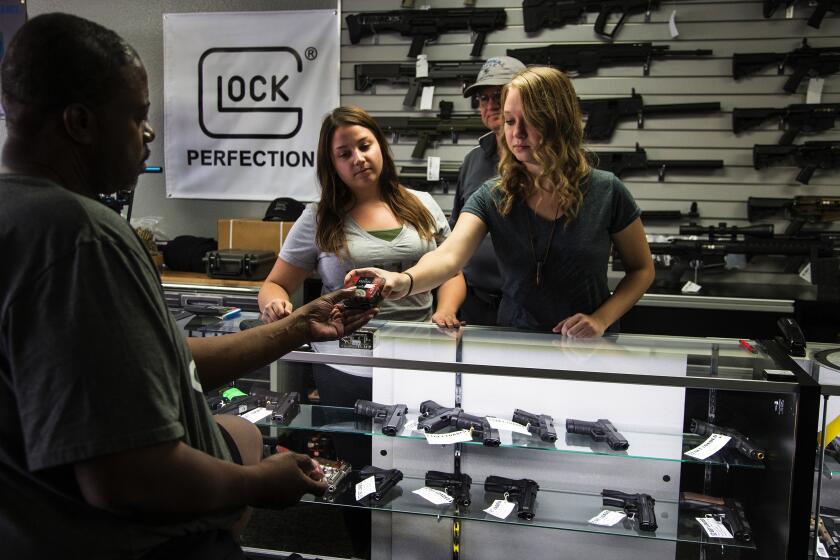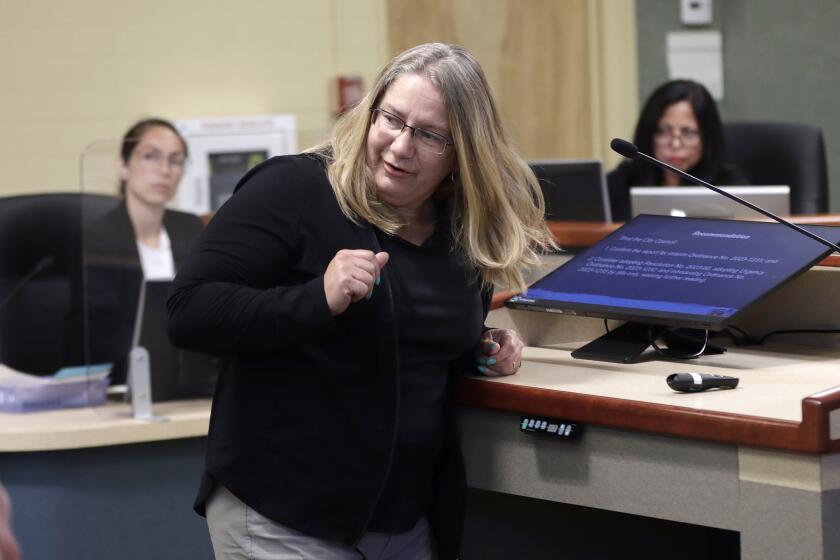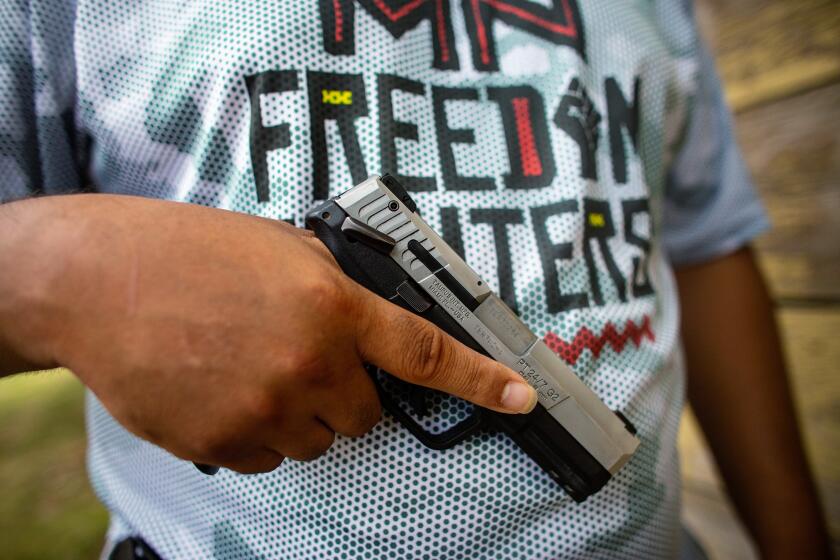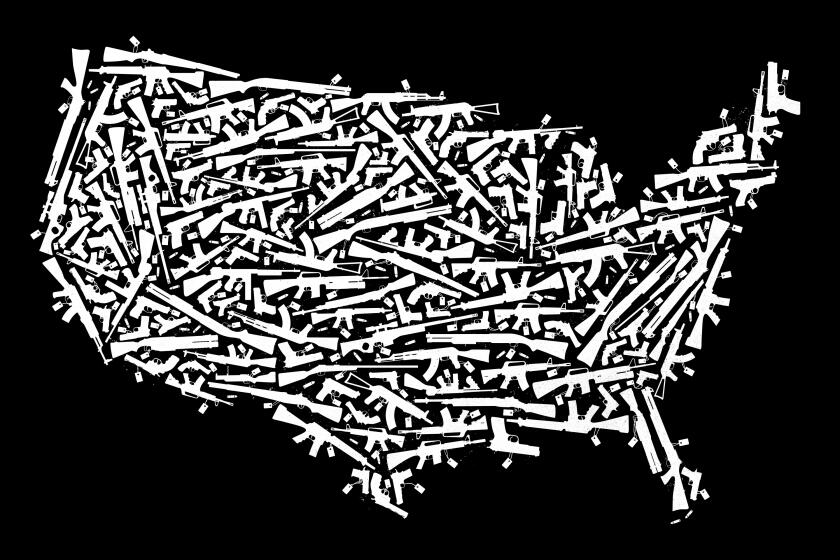If we must rely on ‘history and tradition’ to assess gun laws, does racist history count?
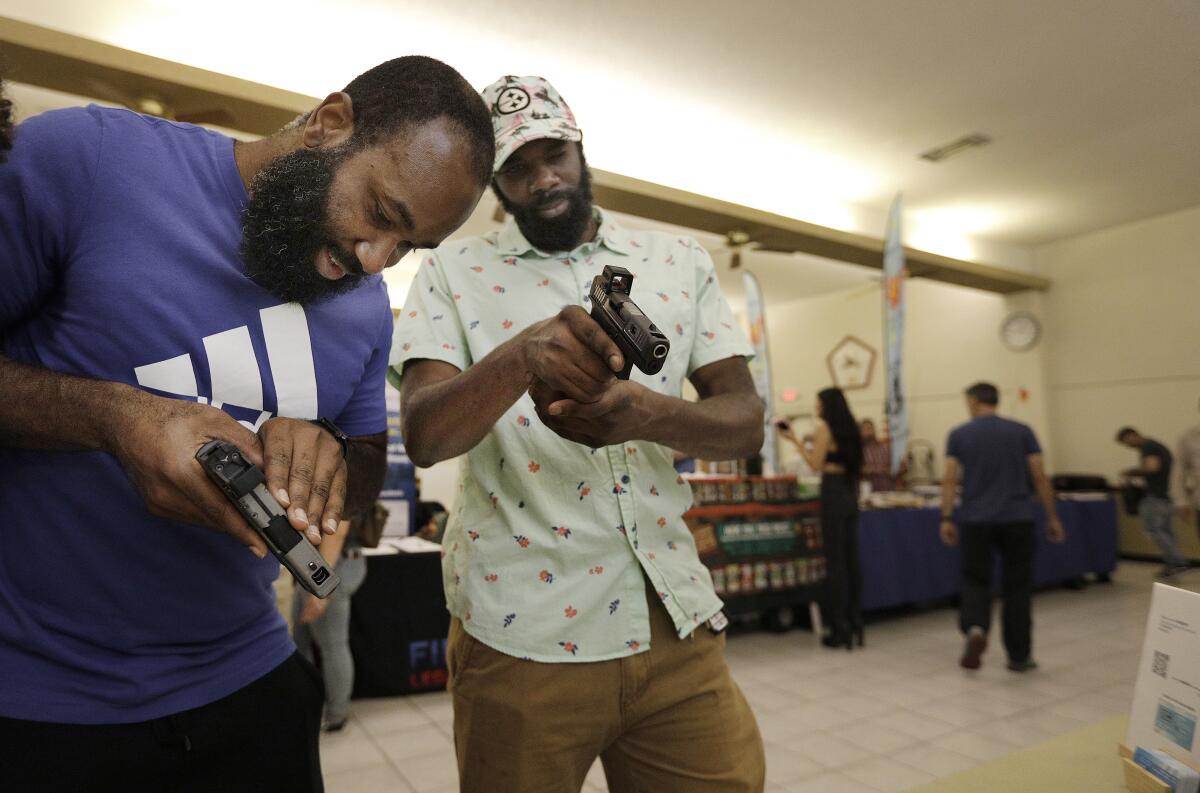
- Share via
As attorneys for the state of California prepared recently to defend in federal court a state law requiring background checks for ammunition purchases, they found themselves in an awkward position.
Under a U.S. Supreme Court ruling from 2022, gun control measures are legitimate only if they are deeply rooted in American “history and tradition” or are sufficiently similar to some other centuries-old law. The state lawyers had conducted a deep dive through hundreds of years of American jurisprudence and identified dozens of historical laws that they felt bolstered the modern law’s legitimacy by showing that the government has long limited access to firearms and ammunition.
But there was a problem: Many of the historical laws they found were virulently racist, restricting access to weaponry for enslaved people, Indigenous Americans and other racial minorities.
In the end, the attorneys in California Atty. Gen. Rob Bonta’s office decided to push ahead and cite the laws, but with a major caveat.
“The Attorney General in no way condones laws that target certain groups on the basis of race, gender, nationality, or other protected characteristic,” they wrote in a footnote to their 2023 filing, “but these laws are part of the history of the Second Amendment and may be relevant to determining the traditions that define its scope, even if they are inconsistent with other constitutional guarantees.”
Last week, U.S. District Judge Roger T. Benitez rebuked the state for relying on such racist laws in a decision that tossed out California’s ammunition background check law as unconstitutional. Benitez rejected the notion that they might represent a legal tradition to be considered under the high court’s new history standard in New York State Rifle & Pistol Assn. vs. Bruen.
A California law requiring people to submit to a background check each time they want to purchase ammunition is unconstitutional, a federal judge ruled.
“These fifty laws identified by the Attorney General constitute a long, embarrassing, disgusting, insidious, reprehensible list of examples of government tyranny towards our own people,” Benitez wrote — and such “repugnant historical examples of prejudice and bigotry will not be used to justify the State’s current infringement on the constitutional rights of citizens.”
On Monday, a three-judge panel of the U.S. 9th Circuit Court of Appeals halted Benitez’s decision from taking effect — keeping the ammunition laws in place — while the state appeals.
In the meantime, the question of whether California and litigants in other gun cases nationwide can invoke old, racist laws remains unsettled, and it’s unclear whether the Supreme Court will allow such laws to inform the “history and tradition” standard moving forward.
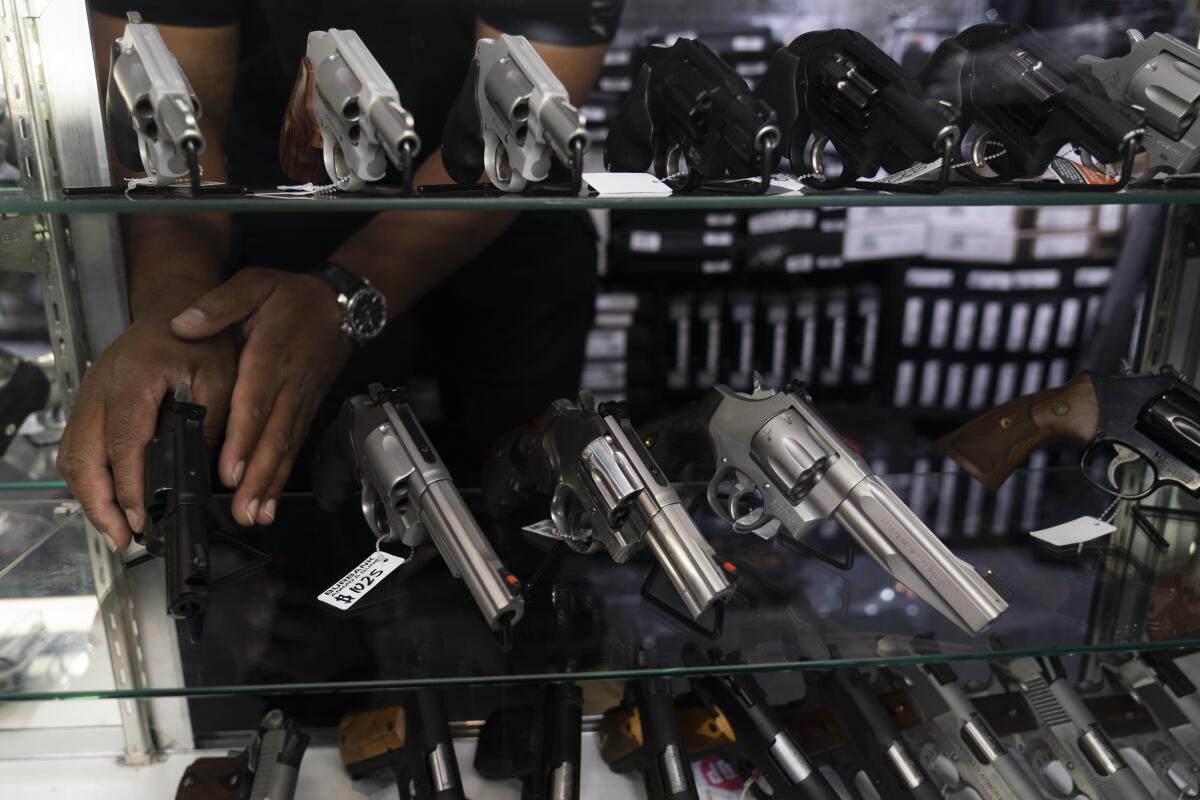
In a nation built on chattel slavery and the brutal colonization of Indigenous communities, racist laws are an inescapable part of our legal tradition despite efforts at reform. And that reality is now front and center in cases challenging gun control measures across the country — to the discomfort of nearly everyone involved.
“If we look at ‘history and tradition,’” said Adam Winkler, a UCLA law professor who focuses on 2nd Amendment law, “we see a whole bunch of racist gun laws.”
Liberal states such as California and other advocates for gun control are in a quandary. They don’t want to focus attention on old, racist laws that are anathema to their modern commitments to diversity, equality and justice. But doing so may be their last, best chance at upholding background checks and other gun control measures.
Dozens of other states are taking sides in the court fight over the legitimacy of California’s effort to ban high-capacity ammunition magazines.
Conservative jurists and gun rights advocates have strongly backed the Supreme Court’s originalist view of 2nd Amendment law, which gives modern deference to the intentions of the nation’s founders at the ratification of the Bill of Rights in 1791. They bristle over the fact that many of the laws at the time took for granted the government’s right to place limits on at least some people’s gun rights.
Scholars say the issue highlights the absurdity of the Supreme Court’s position that the legitimacy of any modern gun law should hinge on whether such a regulation might have fit into a centuries-old legal system — especially one so profoundly flawed in other ways. Liberals also scoff at the notion that the authors of the Bill of Rights could have envisioned modern assault rifles.
Winkler said the debate “points out the central problem of 2nd Amendment law today: that the government has to rely on ancient laws that were designed for a very different society.”
“One of the major concerns around gun laws then was keeping Black people powerless in the face of white supremacy,” he said. “Our gun laws today reflect modern concerns, not the concerns of yesterday.”
Erwin Chemerinsky, dean of the UC Berkeley School of Law, said the rejection of such racist laws as historical “analogues” under the Bruen test by conservative judges such as Benitez reflects a troubling double standard. Benitez has otherwise embraced Bruen’s historical lens, including in recent decisions — also under appeal — that struck down California’s bans on assault-style weapons and large-capacity ammunition magazines.
“Judge Benitez looks at history when it supports his position and ignores it (or dismisses it) when it doesn’t,” Chemerinsky wrote in an email to The Times.
“It is absurd to decide what gun regulations should be allowed based on the law of 1791,” he wrote. “But if we are going to do that, we have to accept the awful aspects of the law of 1791.”
In Southern California, it’s as difficult for a would-be retailer to open a gun store as it is for a city to keep one out.
Others say the absurdity lies in the suggestion that unconstitutional, racist laws of the past should hold any legal weight today.
Stephen Halbrook, a conservative author who argues against broad restrictions on the 2nd Amendment, said he is “glad this is being called out” in Benitez’s latest opinion.
“This should never have been an argument,” Halbrook said, arguing that past injustices do not justify modern ones when it comes to people’s constitutional rights.
Some Black gun owners also expressed unease at the idea that old, racist gun laws should be revived in discussions about 2nd Amendment limits.
Rick Archer, 57, of Yorba Linda, is a Black former U.S. Marine who now teaches basic gun safety and concealed-carry training courses in Orange County. He said he views many of California’s modern gun laws as racist, if not in their explicit language then in their origins and their enforcement in communities of color.
As one example, he mentioned the Mulford Act, which banned the open carry of loaded weapons without a permit in California, and was rushed into law by state legislators after members of the Black Panther Party for Self Defense staged an armed protest at the state Capitol in 1967.
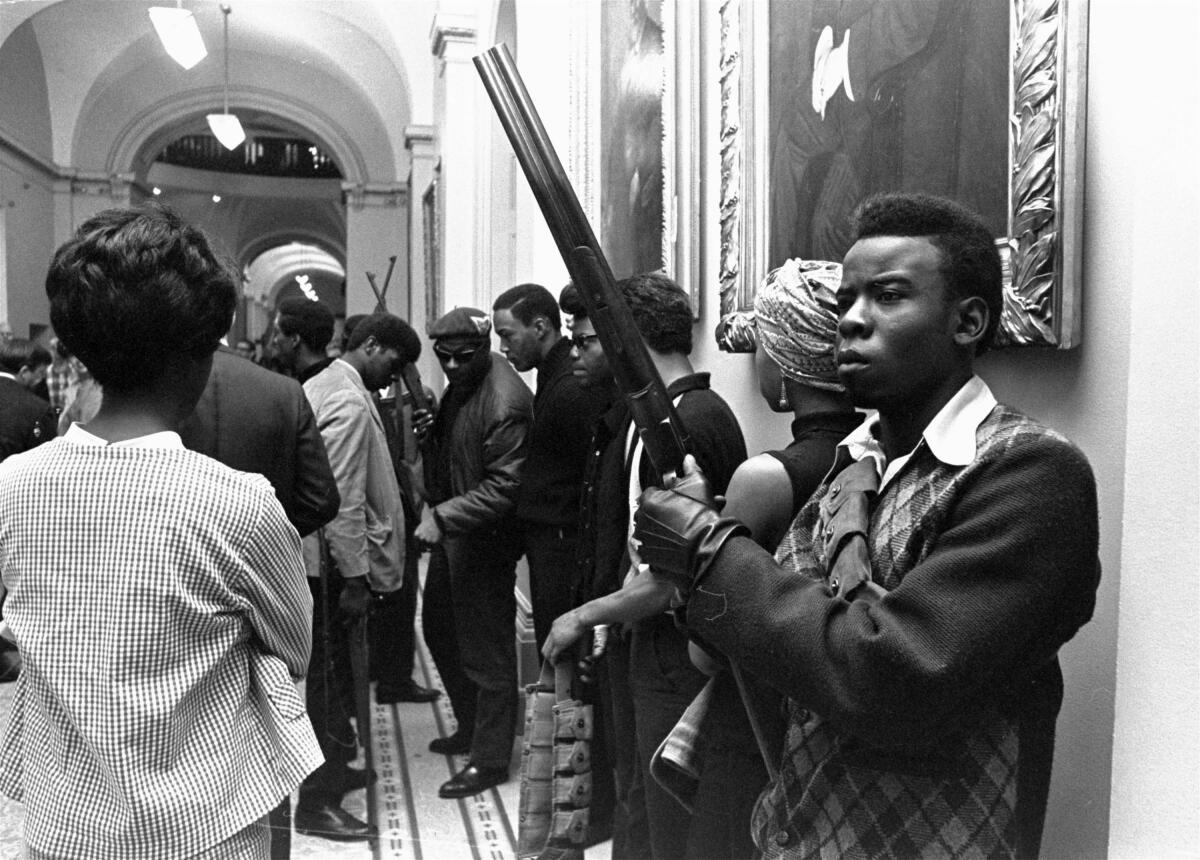
Archer said his white neighbors in Yorba Linda today are “armed to the teeth,” and within their rights to be, while many Black people and other racial minorities in some of the most dangerous cities and neighborhoods in the state are precluded from defending themselves with firearms.
Archer said the state, if it was serious about dismantling racism, would be trying to dismantle its vast system of racist gun laws — not trying to uphold them by citing even more explicitly racist laws of the past.
“We’re supposed to be moving forward, not moving backward,” he said. “If you have to go that far back to justify putting limits on our freedoms — especially if you are going back to racist codes — then this is not the progressive, mixed state that I thought we were in.”
The Supreme Court says the 2nd Amendment covers the right to carry guns in public. But for Black people, the calculation has always been more complicated.
Jake Charles, an associate professor at Pepperdine Caruso School of Law, has studied and written about the issue of old, racist laws being relevant — or not — under Bruen’s “history and tradition” test.
He said he doesn’t believe modern gun laws should be upheld or tossed based on a historical test, but since such a test is required under Bruen, it should at least be honest and applied consistently — regardless of whose modern position on guns it bolsters.
Charles noted that much of the discussion of late has centered on racist laws that excluded enslaved people and other racial minorities from possessing weapons, but there were also racist motivations for many old laws that cemented gun rights for white people. Some early Southern laws, for example, required white men to bring guns to church services as a precaution against slave revolts, he said.
“The expansion of gun rights was often motivated by the same kind of discriminatory rationales that some of the regulations were motivated by,” he said. “They were to enforce white supremacy.”
Charles said racist laws of centuries past should be viewed skeptically by the courts, but not dismissed wholesale. “Whether or not these laws are unconstitutional, they can tell us something about what kind of scope of government power the founding generation would have thought the legislature had” to restrict gun rights or access, he said.
The so-called abstraction approach to gun law precedent has been applied by judges before, including in a pre-Bruen case by then-Circuit Judge Amy Coney Barrett — who is now a Supreme Court justice, Charles wrote last year in the Stanford Law Review.
Barrett issued a dissenting opinion in the case Kanter v. Barr in which she cited old racist gun laws against enslaved people, Indigenous people and Catholics as clearly unjust, but nonetheless informative — helping to establish a clear tradition of lawmakers restricting access to firearms for people they deemed public threats.
Barrett’s approach, Charles wrote, suggested that old racist laws “can provide hints about earlier generations’ understanding of legislative power divorced from their concrete application to specific groups.”
Straw purchases are among the most common firearms trafficking pathways. They’re also one of the hardest problems in gun regulation to solve.
Charles said the Supreme Court could provide more guidance on the issue in its forthcoming decision in United States vs. Rahimi, where it is considering the constitutionality of laws that prohibit the possession of firearms by people under domestic-violence restraining orders.
However, the court may be limited from tackling the issue in full in the Rahimi case because the U.S. government recently shifted its strategy, dropping references to old, racist laws limiting access to firearms for enslaved people and Indigenous Americans that it had cited in lower courts when it reached the high court.
When Justice Clarence Thomas asked why it did so during oral arguments, Solicitor General Elizabeth Prelogar said the government had decided that such laws spoke to a different issue than the one in Rahimi — in part because “those categories of people were viewed as being not among the people protected by the Second Amendment” at the time the old laws were enforced.
In other words, enslaved and Indigenous people weren’t considered citizens — or beneficiaries of the 2nd Amendment’s protections. (Benitez cited a similar argument in his recent decision in the ammunition case.)
Charles said the Supreme Court could weigh in further on racist old laws serving as historical analogues in another case called Range vs. Attorney General, which considers whether individuals convicted of felony crimes can be prohibited from possessing firearms.
If it does, Charles said, he will be watching closely to see where Barrett lands — and whether she once again argues for considering old racist laws as relevant history.
More to Read
Sign up for Essential California
The most important California stories and recommendations in your inbox every morning.
You may occasionally receive promotional content from the Los Angeles Times.
